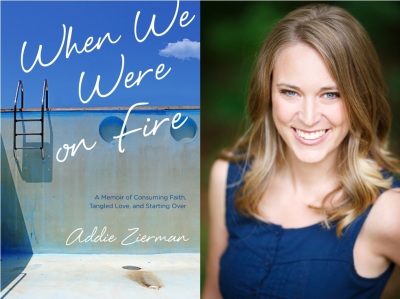Why Are Millennials Leaving the Church? Addie Zierman's New Memoir Explores Why She Left...and Returned

The complicated relationship that Millennials have with organized Christianity has been the subject of a viral spoken word performance, a highly dissected CNN Op-Ed, and is the fear of many a mega-church pastor. Its latest iteration is a book, specifically Addie Zierman's recently released memoir, When We Were on Fire: A Memoir of Consuming Faith, Tangled Love, and Starting Over.
In a title that Publishers Weekly just named one of its Best Books of 2013, Zierman describes her childhood and teenage years growing up in an evangelical subculture that observed the annual student prayer gathering See You at the Pole, memorized the Bible verses at the AWANA kids' club, and shared the Gospel internationally as a mime on a Teen Mania missions trip. As the book progresses and the author enters adulthood, Zierman juxtaposes her youthful passion with her 20-something struggle to find where her own convictions lay.
Originally drafted for MFA thesis, Zierman said that part of what she hoped the book would accomplish would be "to normalize [wrestling and struggling with one's faith] in a way I don't think it has been normalized."
Despite Zierman's teenage immersion in conservative Evangelical subculture and early marriage to a Christian, during her 20's, she struggled to connect with other Christians and find a church that offered the attention and acceptance for which she longed. Discouraged and hurt, she ditched first a church too similar to the one in which she had grown up, then her house church, and ultimately tried to find camaraderie and solidarity at the bar and Caribou Coffee - her cynicism increasing along the way.
Ultimately, her husband's steadfastness, the faithful friendship of her high school Christian friends, and trips to a therapist helped her release much of her bitterness and cautiously return to the church.
Though the book focuses extensively on Zierman's contentious relationship with her faith, it was important to her that her story ultimately be one of reconciliation with Christianity and Christians.
"I think that a lot of the memoirs that have been written about faith have been—the end of it is, you walk away. And I feel like there is another option," Zierman told The Christian Post. "You can take some time and you can be angry and you can be cynical and find your way back in a more health, grown-up way. I would love to see more people do the hard work of figuring out what do we keep, what do we throw away."
Zierman, who as a mother of two young children admits that she is "still trying to figure out" how she will share her faith with them, is reluctant to point the finger at her parents for the collapse of her faith.
"I don't want to make [my parents'] generation feel like they did everything wrong. I think a lot of times there's this blame and I don't think that's the case. I just don't. I think there are a lot of beautiful things about that time and the way that they did things in those years and I think there are hard things and I think that's true of every single generation," said Zierman.
"I hope that [members of my parents' generation] can read the book not as a blame thing or a 'you failed us' type of thing but as 'a looking to how your kids are feeling and why they are struggling with their faith'," she added.
In the meantime, Zierman, through a blog started at the request of her publisher, has cultivated a digital safe space for those whose Christian journey has also been fraught.
"[Blogging] just ended up being such a positive thing for me—just the constant writing process—and finding a community of people who have been through a lot of the same things I have and are still trying to work it out," said Zierman.





























